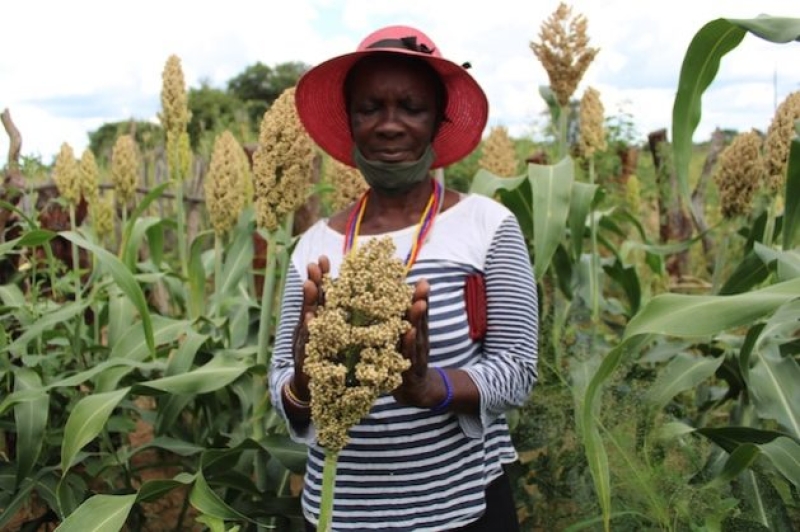- Sri Lanka urges Pakistan to reconsider India match |
- Centre of World Cup storm Mustafizur lands PSL deal with Lahore |
- BNP and Jamaat election camps vandalized in Gazipur |
- Dhaka requests UN rights office investigation into Hadi murder |
- Bangladesh establishes formal diplomatic ties with Grenada |
Laureates For Moonshot Innovation to Avert Hunger Catastrophe

Hardy, nutrition-rich indigenous crops such as sorghum should be esearched as innovative solutions to ending hunger and malnutrition. Credit- Busani Bafana-IPS
By Busani Bafana
BULAWAYO, Jan 14 2025 (IPS) - Neglected indigenous crops, rich in nutrition and resilient to climate change, are key to tackling global hunger only if governments invest in research and development (R&D) to tap the potential of such innovations.
More than 150 Nobel and World Food Prize Laureates are calling for investment in moonshot technologies to realize the potential of innovative solutions such as these hardy crops, warning that without swift action, there is a “food insecure, unstable world.”
Neglected crops are indigenous crops that have been lost or forgotten over time. They are important for the food security of resource-poor farmers and consumers, especially in Africa.
In an open letter to the “Agricultural R&D Moonshot: Bolstering U.S. National Security” meeting in the U.S. Senate Committee on Agriculture in Washington, DC, this week, the Laureates called on world leaders to prioritize urgent agricultural research to meet the food needs of nearly 10 billion people by mid-century. They urged for financial and political support to develop “moonshot” technologies with the greatest chance of averting a hunger catastrophe in the next 25 years.
“The most promising scientific breakthroughs and emerging fields of research that should be prioritized to boost food production include research into hardy, nutrition-rich indigenous crops that have been largely overlooked for improvements,” the Laureates of the Nobel Prize and the World Food Prize said, citing other moonshot technology candidates as improving photosynthesis in staple crops such as wheat and rice to optimize growth and developing cereals that can source nitrogen biologically and grow without fertilizer.
“The scale of ambition and research we are advocating will require mechanisms to identify, recommend, coordinate, monitor and facilitate collaborative implementation of the proposed food security moonshots,” the Laureates said, in advocating for research investment to ensure the world’s future food and nutrition security.
Research to Rid the World of Hunger
While agricultural research had favourable returns on investment, the Laureates bemoaned that it was failing to provide people in developing countries with a nutritious diet in a resilient, environmentally sustainable, and cost-effective manner. The Laureates are convinced that improving agricultural productivity will be enough to meet the world’s future food needs but caution that if we do not prioritize agricultural R&D the global farming systems will be tied to the increased use of diminishing non-replenishable resources to feed humanity.
The world was “not even close” to meeting future food needs, with an estimated 700 million people already going hungry and an additional 1.5 billion people needing to be fed by 2050, the Laureates said, urging for the transformation of the global food value chain.
Other moonshot initiatives that should be researched include the enhancement of fruits and vegetables to improve storage and shelf life and to increase food safety, and the creation of nutrient-rich food from microorganisms and fungi.
In 2007, African Union member countries pledged to invest one percent of their GDP by 2020 in science and research, an ambitious bid for science-led development but a goal many countries have failed to meet.
Science, technology and innovation have been identified as key to Africa’s development under the Africa Agenda 2063—a development roadmap for the next fifty years adopted by African Heads of State.
Climate Change Affecting Food Security
Climate change is projected to decrease the productivity of most major staples when substantial increases are needed to feed a world, which will add another 1.5 billion people to its population by 2050.
For maize, the major staple for much of Africa, the picture is particularly dire, with decreasing yields projected for virtually its entire growing area. Increasingly common extreme weather events associated with climate change will only make matters worse. Moreover, additional factors such as soil erosion and land degradation, biodiversity loss, water shortages, conflict, and policies that restrict innovation will drag crop productivity down even further.
“Yet as difficult and as uncomfortable as it might be to imagine, humanity is headed towards an even more food insecure, unstable world by mid-century than exists today, worsened by a vicious cycle of conflict and food insecurity,” said the Laureates, who include Robert Woodrow Wilson, who won the 1978 Nobel Prize for Physics for his discovery that supported the big bang theory of creation and Wole Soyinka, the first Black African to win the Nobel Prize in Literature.
“The impacts of climate change are already reducing food production around the world, but particularly in Africa, which bears little historical responsibility for greenhouse gas emissions yet sees temperatures rising faster than elsewhere,” Akinwumi Adesina, president of the African Development Bank, who received the World Food Prize in 2017, said in a statement. “In low-income countries where productivity needs to almost double by 2050 compared to 1990, the stark reality is that it’s likely to rise by less than half. We have just 25 years to change this.”
Other notable signatories to the letter include the 14th Dalai Lama., Ethiopian-American plant breeder and U.S. National Media of Science recipient Gebisa Ejeta, Akinwumi Adesina, president of the African Development Bank and Cary Fowler, joint 2024 World Food Prize Laureate, who is also the outgoing U.S. Special Envoy for Global Food Security who coordinated the appeal.
“We must take bold action to change course,” said the Laureates, adding, “We must be prepared to pursue high-risk, high-reward scientific research with the goal of transforming our food systems to meet the nutritional needs of everyone sustainably.”
IPS UN Bureau Report

